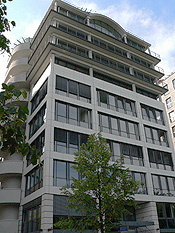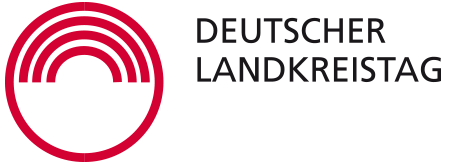
Promoter of rural areas
The German County Association (“Deutscher Landkreistag”) is the leading association of the 294 German counties (Landkreise). The Landkreis sector covers around 96 per cent of the surface area of the Federal Republic of Germany and represents three quarters of the local authorities, who in turn represent 55 million inhabitants or 68 per cent of the German population. The association understands itself as promoter of the rural areas in Germany.
The German County Association is unlike other interest groups (e.g. private sector), as it represents public interest; via the local authorities which are politically responsible to German citizens.
Protection of the local government self-administration on Federal level
The main tasks of the German County Association are to promote local government self-administration (which is guaranteed by the German constitution, network between Landkreise) and foster common interests between all local government bodies vis-à-vis the Federal State and the public.
Though Landkreise – which alongside the municipalities form the 3rd level of the state organisation are assigned to the Länder (2nd level) – they are increasingly concerned with developments on a national level. As most of the German Federal laws are executed by the local authorities, the German County Association participates in the legislation process – as long as the issue concerns local authorities – via the German Parliament (Deutscher Bundestag) or the respective ministries. Additionally, the Association contributes – either in decision-making or in consultation - to the work of several bodies and institutions of the Federal state and the Länder.
Broad range of tasks
The German County Association is active in a broad range of local tasks, including: municipal law, e-government, modernisation of administration, public services law, savings banking, local services of general interest (energy, water, waste water, waste), business development, social affairs, youth, health, transport law, environmental law, planning law and European affairs.
Equal living conditions in rural areas
One of the most important aims of the German County Association is safeguarding and establishing equal living, supply, working, administration and development conditions in rural areas in proportion to urban areas. The association is especially concerned with sustainable development in peripheral rural areas, covering issues such as demographic change. A further main focus lies within the commitment of the Landkreise as responsible authority for social welfare as well as children and youth social services and local employment policy.

Structure of the Association
The German County Association is a legally registered member organisation and incorporates a federal structure. Its direct members are the County Associations of the 13 Länder (except for the “city-states” Berlin, Hamburg and Bremen), which lobby for local concerns in their respective Land. Via their Land-Association the 295 German counties (including the Hannover region and the City Council Saarbrücken)are indirect members of the Association. Other direct members are the Social Welfare Association of Hesse, The Rhineland Regional Council, the Regional Council Westphalia-Lippe, the Association of the Bavarian districts, the Social Welfare Association of Saxony, the Local Administrative Union of the Ruhr Area, the Local Social Welfare Association of Mecklenburg-Vorpommern and the Local Association for Youth and Social Affairs in Baden-Württemberg.
Organs
- The Policy Committee (General Assembly) consists of delegates, appointed by their Land-Associations. The policy committee establishes guidelines for the Association’s policy, organisational tasks, annual budget and job chart. In addition, it elects the Association’s President, four Vice-Presidents and Executive Director.
- The Board consists of the President, Executive Director and the Presidents of the 13 single Land-associations and is the Presiding Board. Decisions on all matters which are important in local policy are finally taken by the Board. Contrary to the two other central associations on Federal level, there is no direct participation of Federal or Land politicians.
- The President represents the Association and chairs the Policy Committee and the Steering Committee.
- The Executive Director is elected for twelve years and manages the head office in Berlin.
European policy and partnerships
There is increasing need for German Landkreise to be prepared for the implementation of European directives and regulations. The German County Association has its own office in Brussels, which represents the interests of the German Landkreise vis-à-vis the European Institutions (above all European Commission, European Parliament and Committee of the Regions). The Association also networks with other local associations such as Association of Polish Counties or Association of Finnish Local and Regional Authorities, and contributes to an exchange of experiences as well as to arranging county-partnerships. Moreover, the German County Association is founding member of CEPLI, the European Confederation of Local Intermediate Authorities representing about 900 Local Intermediate Authorities of seven European Countries (Belgium, France, Germany, Italy, Poland, Romania and Spain).
